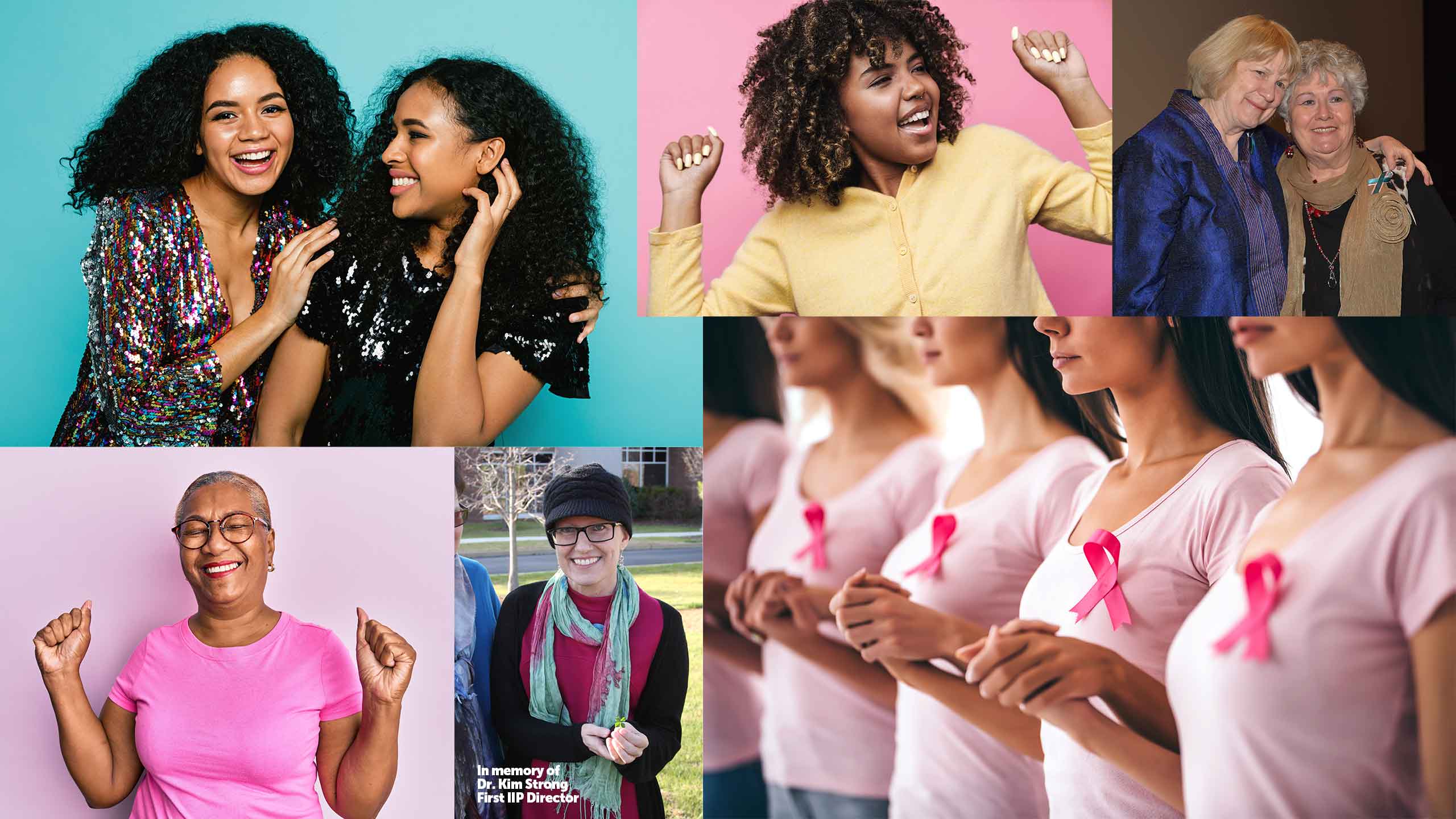Information is Power
The initiative democratizing cancer genetic testing
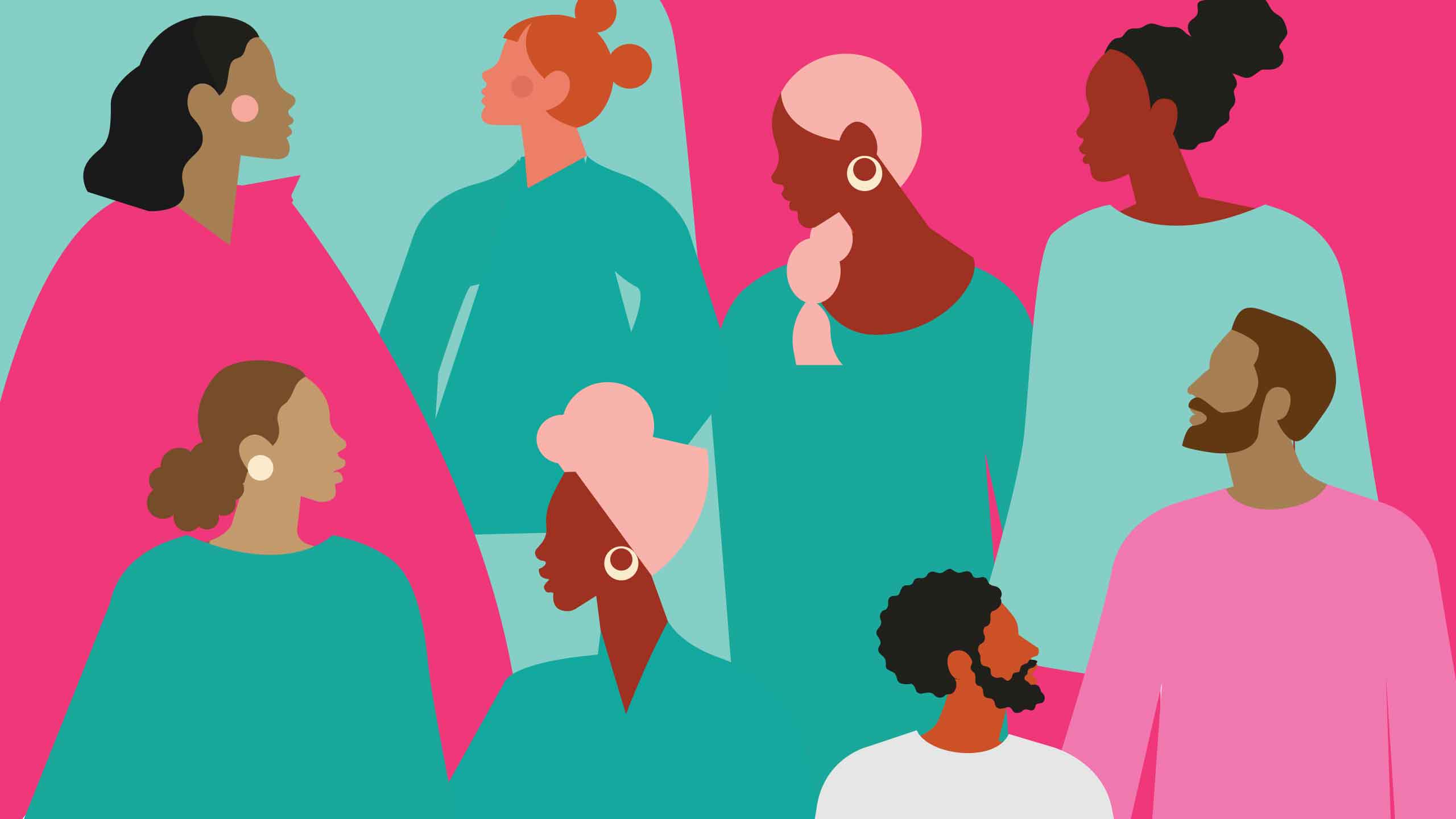
In 2014, an audience of nearly 1,000 people sat under the Saturn V rocket at the U.S. Space and Rocket Center in Huntsville, Alabama, listening to world-renowned geneticist Mary-Claire King, PhD, share her life’s work on breast cancer. That day, the crowd heard the amazing story of how Dr. King and her lab discovered the BRCA1 gene and its link to hereditary breast and ovarian cancer, a finding that saved the lives of thousands of women and men.
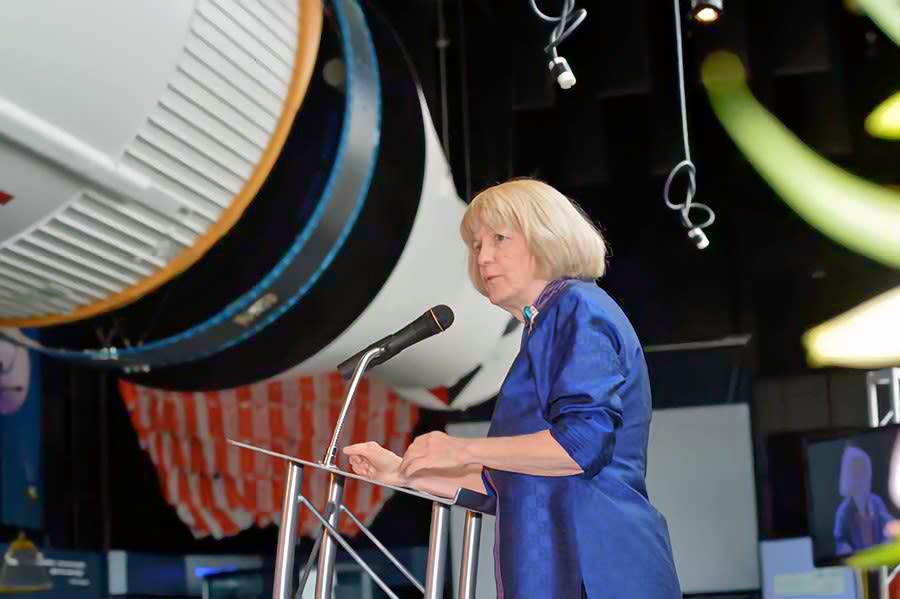
Dr. Mary-Clarie King
Dr. Mary-Claire King
Little did the enthralled crowd know Dr. King would issue a challenge that set a groundbreaking community-wide cancer health initiative in motion. The challenge would empower thousands of women and men across North Alabama to take their health into their own hands. Based upon her knowledge of cancer genetics and her own findings, Dr. King told the audience she believed that access to changing technology made it possible to offer every young woman genetic testing as part of regular healthcare. Early knowledge of increased risk for breast and ovarian cancers allows women and men to participate in earlier, more frequent cancer screenings. She challenged HudsonAlpha and Huntsville to lead the effort in testing young women for breast cancer gene mutations, regardless of their family history.
That challenge led to the creation of the Information is Power genetic testing initiative. The initiative launched at the Tie the Ribbons Luncheon event in 2015, just a year after Dr. King issued the challenge. During the interim year, a frenzy of work went into standing up the brand-new public health program. Researchers, genetic counselors, volunteers, companies, and other leaders at HudsonAlpha and the City of Huntsville came together to build the foundation for Information is Power.
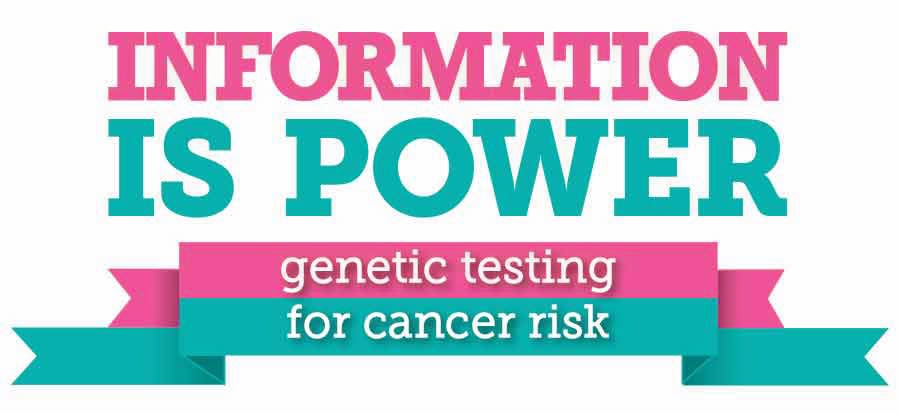
The concept of Information is Power started simply: every woman living in Madison County who was 30 years old was eligible to receive a free genetic test that identified gene variants known to increase the risk of breast and ovarian cancer. With the help of initial funding from Redstone Federal Credit Union, the Cities of Huntsville and Madison, the Madison County Commission, the Jane K. Lowe Foundation, and support from private philanthropy, the initiative did so well in its first year that it was extended and expanded.
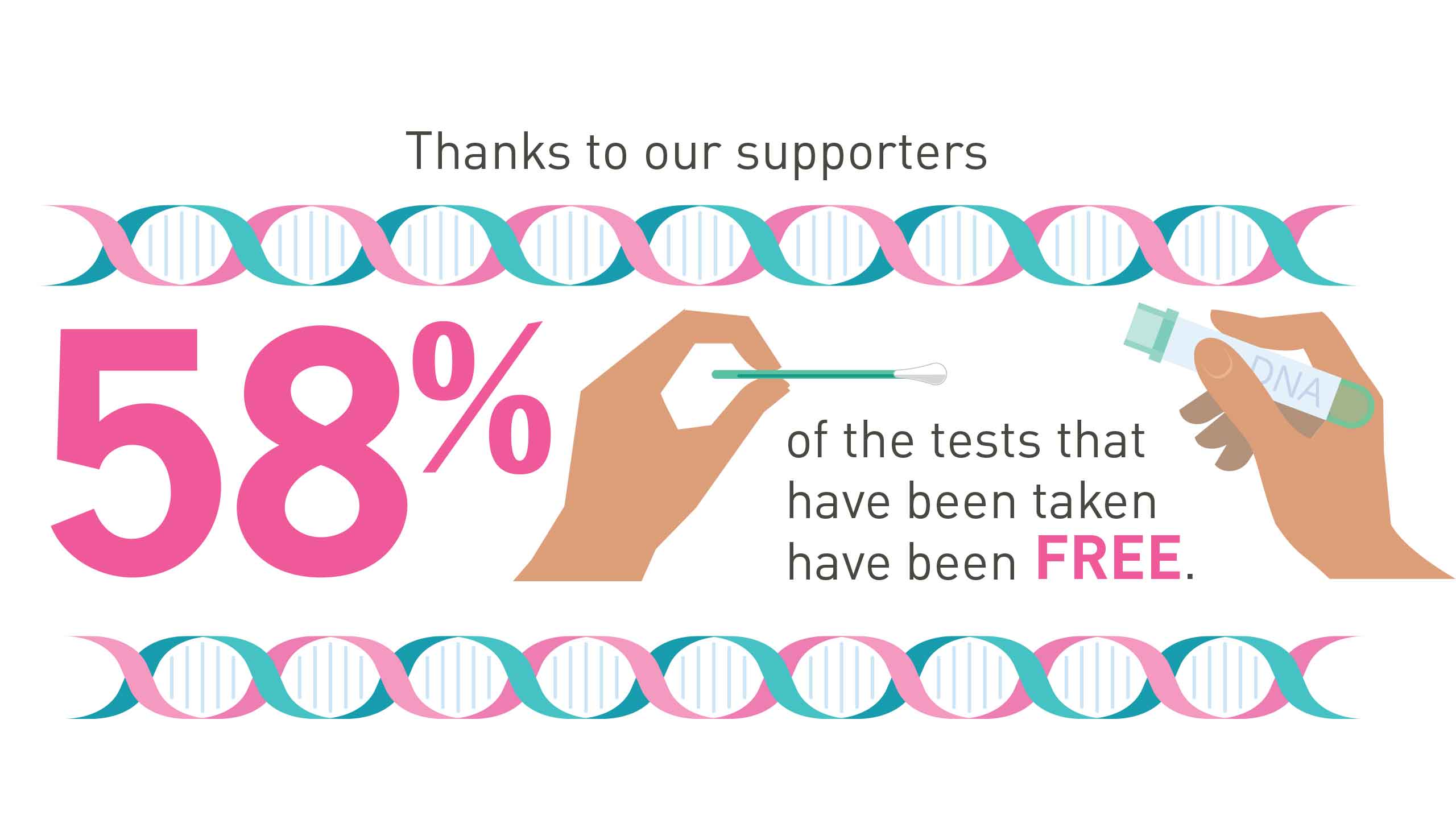
During the second year, free testing was available for 30-year-old women and men in Madison, Jackson, Limestone, Marshall, and Morgan Counties. The initiative did not stop there. In 2018, the age range for free tests was expanded to 28 to 32, and remains there today. All other residents of those counties, aged 19 and older, are eligible for discounted genetic testing through the program as well.
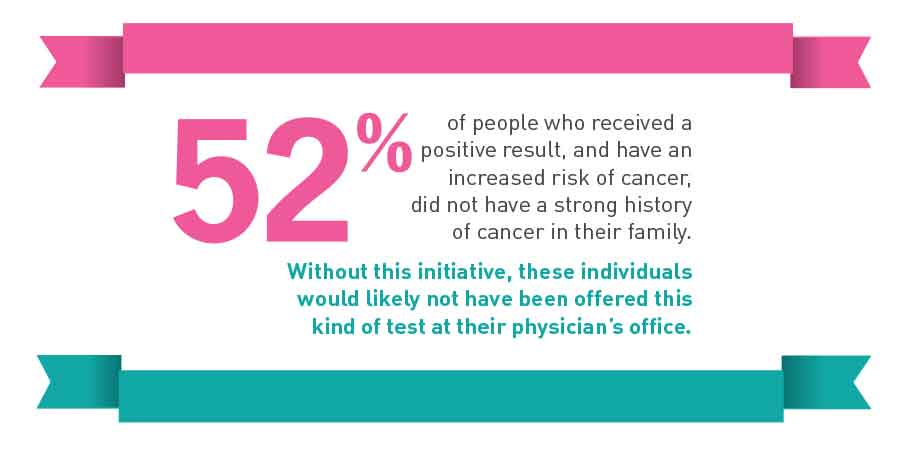
Today, the genetic test looks at several dozen genes associated with increased risk for breast, ovarian, colon, and endometrial (uterine) cancers. Since 2015, more than 6,200 people have participated, and four percent have discovered they tested positive for a gene change that increases the risk of developing cancer. Based on personal and family history information provided by these patients, half of the positive patients would not have been tested under standard clinical guidelines.
North Alabama
Information is Power began in Madison County in 2015. After its successful first year, it expanded to include North Alabama counties: Madison, Marshall, Morgan, Limestone, and Jackson.
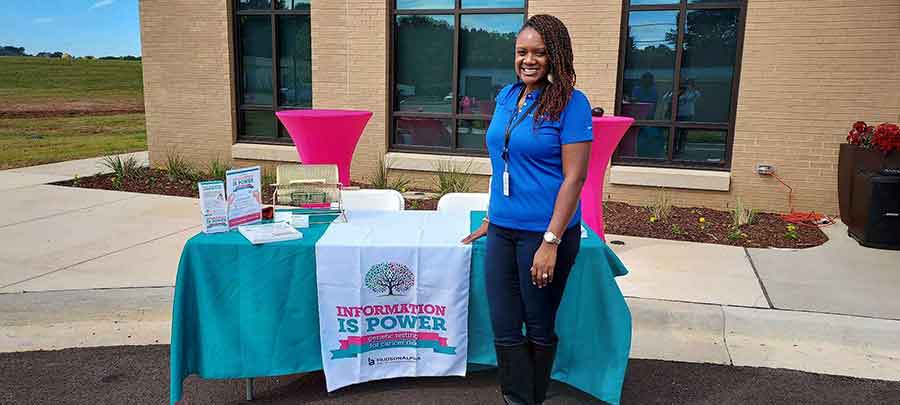
In 2021, the initiative brought cancer awareness events and free testing to Alabama A&M University.
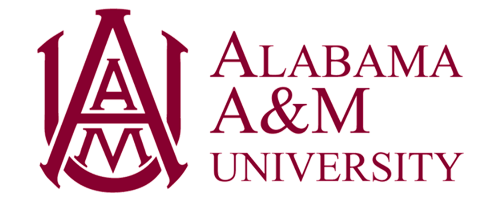
Black Belt
In 2021, thanks to funding from the Alabama Power Foundation, Information is Power expanded into the Black Belt region. The efforts are made possible thanks to relationships with several Montgomery area physicians, nine locations of Selma-based Rural Health Medical Program Inc. (Dallas County, Demopolis, Marion, Monroeville, Pine Apple, Thomaston, Thomasville, Uniontown and Yellow Bluff), and Alabama State University.
Central Alabama
In 2022, thanks to support from the Breast Cancer Research Foundation of Alabama, the initiative spread its reach into central Alabama, bringing cancer awareness events and free testing to students at Miles College.
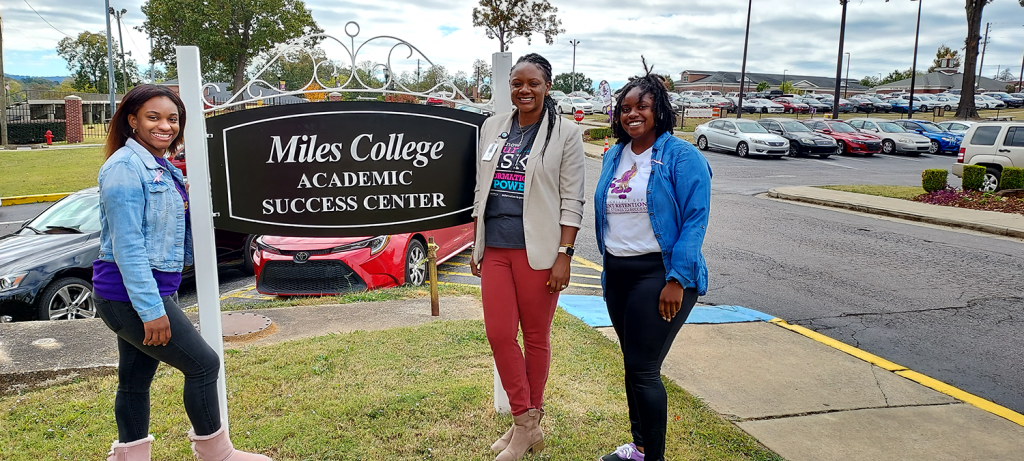
Talladega County became a part of Information is Power in 2023 through the participation of Talladega College.
Meet the Power-Duo Democratizing Genetic Testing
Information is Power is led by HudsonAlpha Faculty Investigator Sara Cooper, PhD, and Program Manager Kristy Bell. I sat down to talk with Sara and Kristy about the recent expansion of Information is Power and their plans for the program's future.
Sarah Sharman: Sara, you’ve been at the Institute since IIP was launched, but you only started leading the program in 2019. What inspired you to take on the leadership role?
Sara Cooper: In my lab, we study several cancers generally identified in late stages, making them hard to treat successfully. Early detection is so important for many cancers, and genetic risk testing is crucial to our ability to catch cancers early. I joined the Information is Power team to help bring this knowledge to more people in our community and our state.
SS: Since you started leading the program in 2019, there have been big changes regarding who you’re recruiting for participation. Can you talk about what sparked these changes?
SC: When I took over the program, we began to think about how this technology has the potential to benefit everybody. But it hasn’t been easy to ensure it is accessible to everyone. Upon reviewing the existing data, I noticed a problem: there was little racial diversity among the participants. It became our main goal to expand the program’s reach to a more diverse community, with a specific focus on medically underserved populations.
We were fortunate to be funded to offer this program in the Black Belt region of Alabama and have been really working hard to get that off the ground. In the Black Belt, people are notoriously medically underserved. They typically have limited access to health care, much less genetic information. We’re trying really hard to not only make the testing accessible but also provide the resources that patients are going to need to understand the information that they’re receiving. It is also important that they have the support of other healthcare professionals they might need access to, particularly if they have a positive test. I’m so excited about some of our early successes, especially our new collaborations with clinicians and medical clinics in Montgomery and Selma to offer testing to their patients.

SS: Kristy, you joined right around the time the program talked about expanding to the Black Belt. What drew you to this program and your position here at HudsonAlpha?
Kristy Bell: The Information Is Power program was interesting to me because it would allow me an opportunity to help people differently. My background is in social science, so my work always involved helping people, but mostly beginning in a punitive manner. A lot of the time, when people were ready for help, it was often too late. Through the role of Information is Power, I would have the chance to educate people about their hereditary cancer risk and overall health and wellness. So, I think that’s what excited me about wanting to be a part of the Information Is Power program.
Like many others, I also have a strong personal connection to cancer. The lifetime cancer risk for women in the United States is 1 in 8. I am one of seven girls. We were all very surprised when my sister was diagnosed with breast cancer at 39, just two months before she turned 40 before she had even gotten her first mammogram (recommended at 40 if you have no family history). Luckily, she's a 13-year survivor now. My father passed away from stomach cancer when I was nine years old. The treatment then was mostly radiation. Coming into this space now and seeing the advancements in treatment makes me even more excited to be a part of the Information Is Power program.
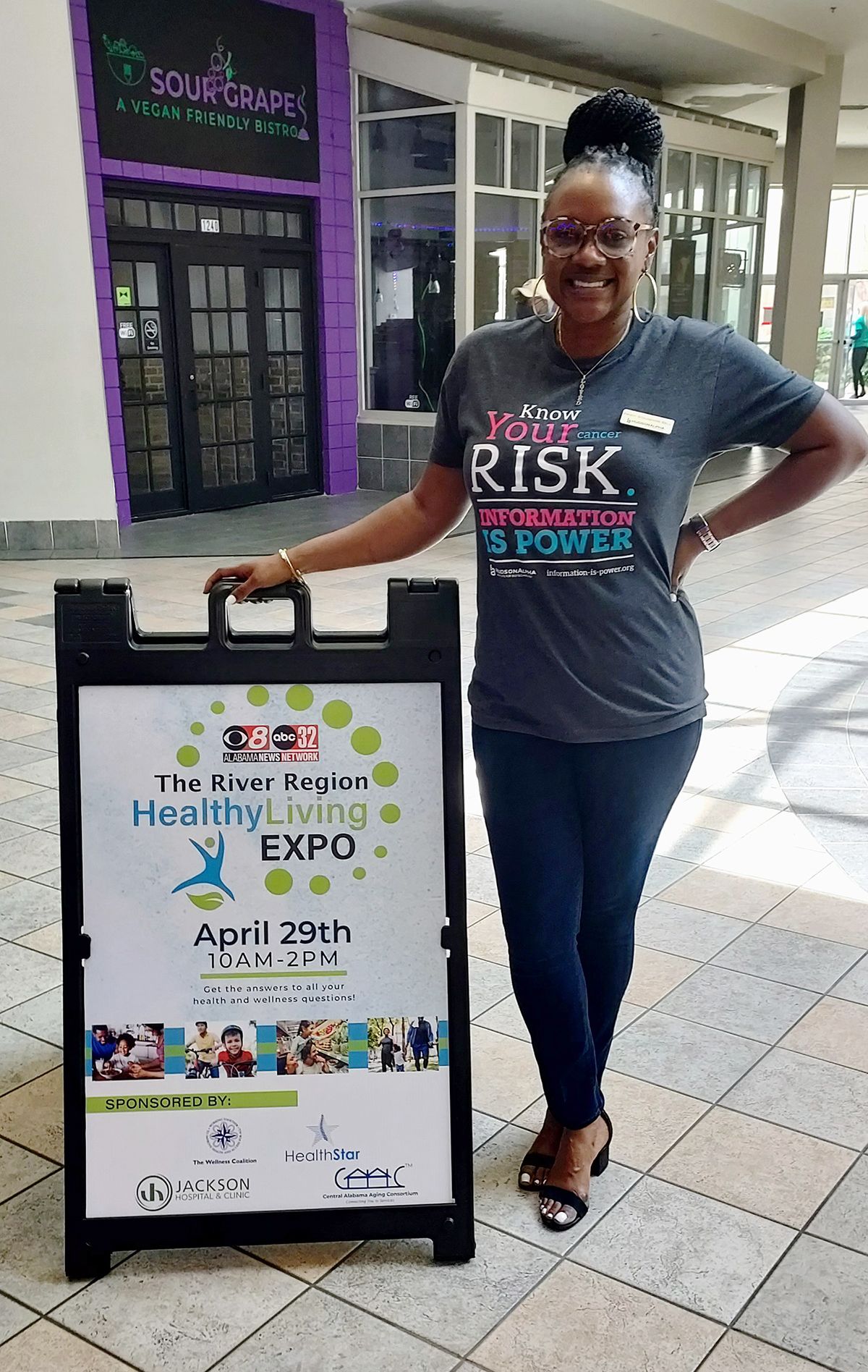
SS: What has your experience been like leading the charge on creating these new relationships for IIP?
KB: I knew that if we wanted to provide these opportunities to the underserved areas, we would have to go in wanting to build relationships first, then build partnerships off of those trusted relationships. For me, that is one of my strengths. I truly believe that had we not gone in there and built those relationships and gained the people's trust first, I don't think we would have been as successful as we've been in the last two years.
There are barriers in everything we do, regardless of the population. People fear certain things, especially things that are unknown to them. Even when I did the screening, I was fearful because I kept thinking, ‘Is this going to be a diagnosis like my sister?’ But the more I’ve learned about the process, the more I can spread the word to other people. I love working with the underserved communities. It allows me to provide education and access to those who wouldn’t normally have this type of screening and education as an option. It gives them the chance to think, ‘She went through the process of a test. And she's bringing this to us not because she's just trying to get a number but because she cares and knows how this can benefit us.’
We host awareness events in the communities we’re trying to reach. But it isn’t just us talking about Information is Power. We bring trusted leaders and physicians from the community to the events to educate individuals about cancer and the power of genetic screening. Our first Colon Cancer Awareness event at Alabama A&M was a great success. We had an amazing panel of smart, trustworthy physicians from the community. That's how we began to build that relationship and partnership with Alabama A&M. What we learned from there, we were able to take to other sites like ASU, Miles College, and the Black Belt. Our goal is to continue expanding, educating, and bringing awareness.
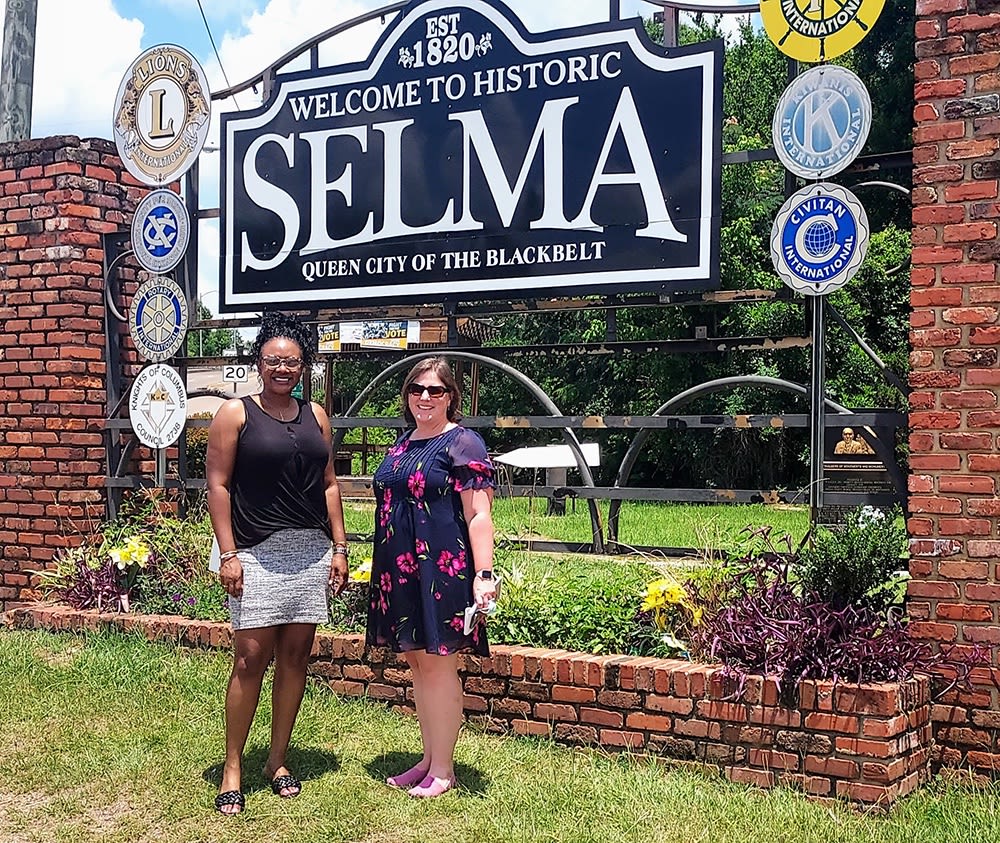
SS: Besides the wonderful relationships you’re building in the Black Belt community, have you also reached underserved communities in North Alabama?
SC: Over the last two years, we have been putting a lot of energy into our Alabama A&M relationship. We’ve learned a lot from the experience that we hope serves as a foundation for new relationships. We recently received a generous donation from the Russel Hill Cancer Foundation to support North Alabama outreach, as well as a grant from the Community Foundation of Greater Huntsville’s Racial Equity Fund. That will be broader and will include continuing the work that we've done at Alabama A&M, but we've been working on thinking about what those other relationships might look like. We will continue doing many things that we've always done that we know work, like the online sign-up and mailed kits. We’ll continue to meet the community where they are, hosting regular outreach events, especially in the months of September and October when cancer awareness is really top of mind for people.
We also recognize that one of the things that has worked really well for us on some of the college campuses is when we partner with healthcare providers. Doing this addresses a significant barrier, not just within underserved communities but for everyone. Involving physicians in the program ensures post-results communication between providers and participants, a key element for achieving our intended impact. We're actively exploring avenues to forge relationships with healthcare providers in North Alabama, although specific details are yet to be finalized. This presents a valuable opportunity, making the testing more accessible to the local population and enhancing overall accessibility.
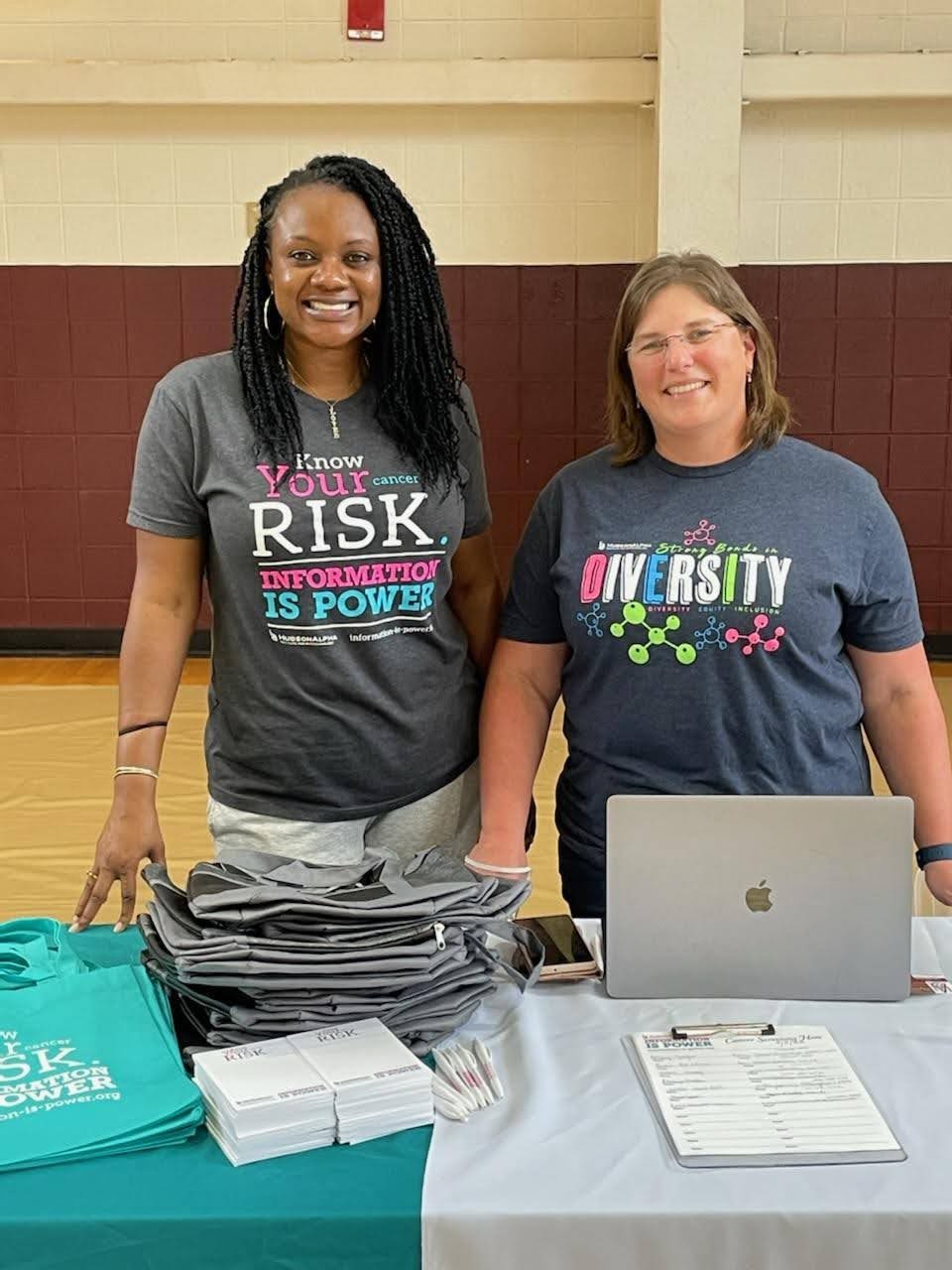
SS: What have been some of the challenges you’ve had to overcome when reaching out to these new groups of people?
KB: A key hurdle involves limited awareness and education. Many individuals are unfamiliar with the insights genetic testing offers or the impact of genetics on health. This extends beyond communities to some healthcare providers who may not fully grasp its potential. Since our testing necessitates physician approval, we've focused on educating healthcare providers to ensure they're at ease authorizing the test and guiding patients through subsequent actions following a positive outcome.
SC: In expanding Information is Power to diverse communities, we've also encountered challenges related to underresourced institutions. Some healthcare settings rely on paper records due to limited technology infrastructure, including limited connectivity in some places. As we reach out to underserved regions like the Black Belt, even basic tasks like collecting necessary participation forms pose difficulties. Unlike our North Alabama operations, where digital forms are standard, many clinics in these areas struggle with unreliable cellular service, impacting data submission. We've collaborated closely with our partners to address these concerns and establish contingency plans. Additionally, the recent introduction of a new mobile unit in rural areas holds promise for overcoming these obstacles.
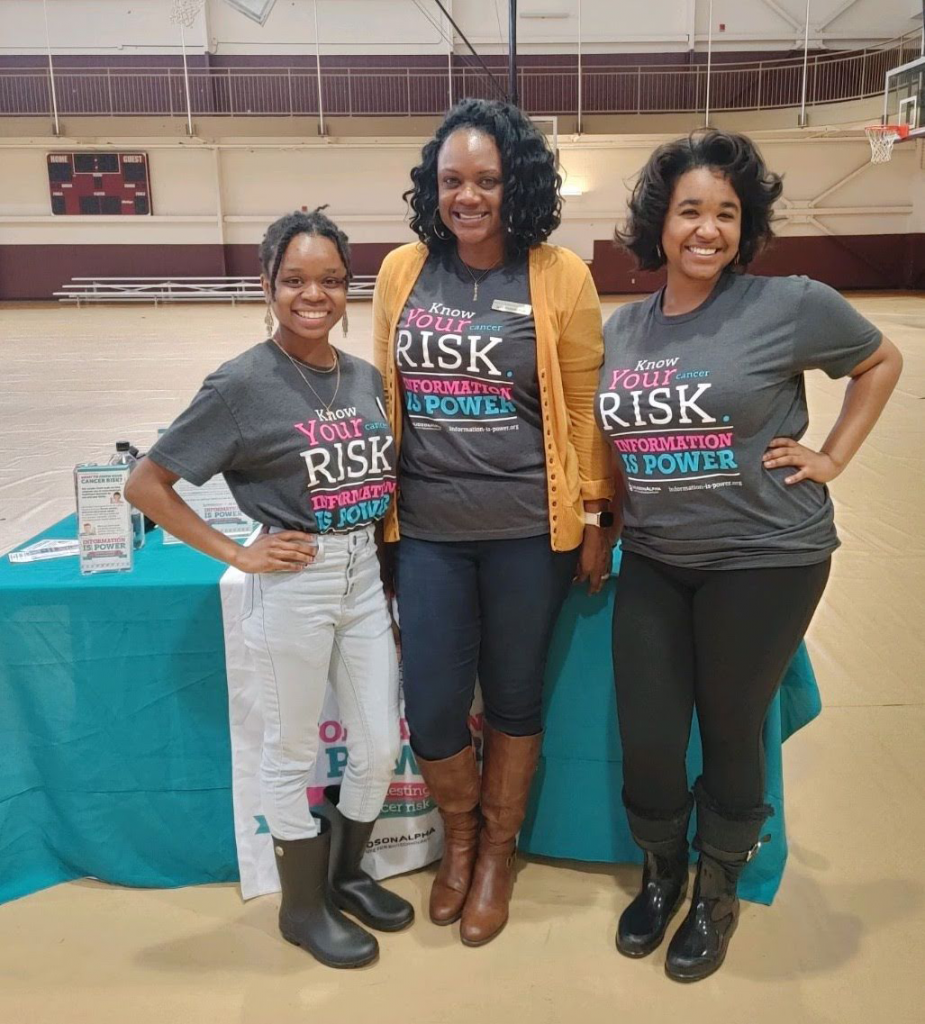
SS: What has been one of your proudest accomplishments with the program so far?
KB: Definitely the expansion into the Black Belt. We are especially grateful for the support of the Alabama Power Foundation for making this expansion possible.
SC: I agree. Statistics-wise, one of the things that I'm most proud of is when I took over the program, our total participation from non-white individuals was three percent, and now it's about ten percent. Madison County’s African-American population is about 25 percent, so we still have work to do. But in the two years that Kristy has been working with us, through our partnerships with Rural Health, Dr. Jernigan, A&M, ASU, and Miles College, we've really reached a lot of people. We've tripled the number of African Americans that have participated in the program in a two-year period.
SS: The program relies heavily on philanthropy and grant funding. Your supporters have helped over 6,000 people in North Alabama, and now the Black Belt, gain access to important genetic information. However, if money were not an object, what else would you do?
SC: We are so thankful to all of the individuals and organizations that have supported Information is Power throughout the years. Their consistent support has made a significant impact on our ability to reduce barriers to testing and provide support, education, and awareness throughout our community and beyond. Continued support of the program will help reduce the impact of cancer in our community.
In the future, I would probably expand the age range for free testing. I think we've found that young adults are receptive to the idea of participating and, by some measures, have the most to gain by learning about their cancer risk early on. When the test first started, we chose 28- to 30-year-olds to receive free testing because individuals with increased cancer risk would likely want to initiate screening around that age. The information is also useful for reproductive planning. Information is Power was built on the idea that if you know what your risk is, then you can make the decisions that work best for you.
The Information Is Power screening test is available for $225. Information about how to order and whether you may qualify for reduced cost or free testing can be found at http://www.information-is-power.org or by calling 256-327-9597.
